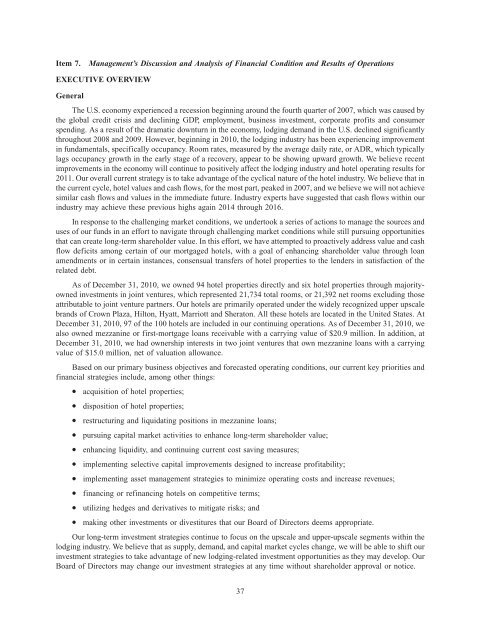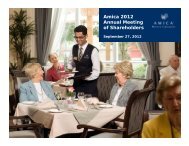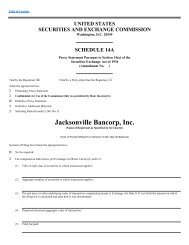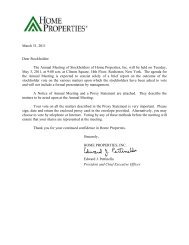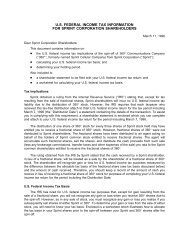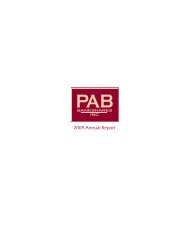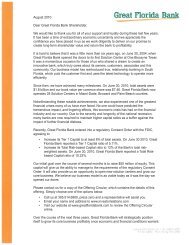2010 AnnuAl RePoRT - SNL Financial
2010 AnnuAl RePoRT - SNL Financial
2010 AnnuAl RePoRT - SNL Financial
Create successful ePaper yourself
Turn your PDF publications into a flip-book with our unique Google optimized e-Paper software.
Item 7.<br />
Management’s Discussion and Analysis of <strong>Financial</strong> Condition and Results of Operations<br />
EXECUTIVE OVERVIEW<br />
General<br />
The U.S. economy experienced a recession beginning around the fourth quarter of 2007, which was caused by<br />
the global credit crisis and declining GDP, employment, business investment, corporate profits and consumer<br />
spending. As a result of the dramatic downturn in the economy, lodging demand in the U.S. declined significantly<br />
throughout 2008 and 2009. However, beginning in <strong>2010</strong>, the lodging industry has been experiencing improvement<br />
in fundamentals, specifically occupancy. Room rates, measured by the average daily rate, or ADR, which typically<br />
lags occupancy growth in the early stage of a recovery, appear to be showing upward growth. We believe recent<br />
improvements in the economy will continue to positively affect the lodging industry and hotel operating results for<br />
2011. Our overall current strategy is to take advantage of the cyclical nature of the hotel industry. We believe that in<br />
the current cycle, hotel values and cash flows, for the most part, peaked in 2007, and we believe we will not achieve<br />
similar cash flows and values in the immediate future. Industry experts have suggested that cash flows within our<br />
industry may achieve these previous highs again 2014 through 2016.<br />
In response to the challenging market conditions, we undertook a series of actions to manage the sources and<br />
uses of our funds in an effort to navigate through challenging market conditions while still pursuing opportunities<br />
that can create long-term shareholder value. In this effort, we have attempted to proactively address value and cash<br />
flow deficits among certain of our mortgaged hotels, with a goal of enhancing shareholder value through loan<br />
amendments or in certain instances, consensual transfers of hotel properties to the lenders in satisfaction of the<br />
related debt.<br />
As of December 31, <strong>2010</strong>, we owned 94 hotel properties directly and six hotel properties through majorityowned<br />
investments in joint ventures, which represented 21,734 total rooms, or 21,392 net rooms excluding those<br />
attributable to joint venture partners. Our hotels are primarily operated under the widely recognized upper upscale<br />
brands of Crown Plaza, Hilton, Hyatt, Marriott and Sheraton. All these hotels are located in the United States. At<br />
December 31, <strong>2010</strong>, 97 of the 100 hotels are included in our continuing operations. As of December 31, <strong>2010</strong>, we<br />
also owned mezzanine or first-mortgage loans receivable with a carrying value of $20.9 million. In addition, at<br />
December 31, <strong>2010</strong>, we had ownership interests in two joint ventures that own mezzanine loans with a carrying<br />
value of $15.0 million, net of valuation allowance.<br />
Based on our primary business objectives and forecasted operating conditions, our current key priorities and<br />
financial strategies include, among other things:<br />
k<br />
k<br />
k<br />
k<br />
k<br />
k<br />
k<br />
k<br />
k<br />
k<br />
acquisition of hotel properties;<br />
disposition of hotel properties;<br />
restructuring and liquidating positions in mezzanine loans;<br />
pursuing capital market activities to enhance long-term shareholder value;<br />
enhancing liquidity, and continuing current cost saving measures;<br />
implementing selective capital improvements designed to increase profitability;<br />
implementing asset management strategies to minimize operating costs and increase revenues;<br />
financing or refinancing hotels on competitive terms;<br />
utilizing hedges and derivatives to mitigate risks; and<br />
making other investments or divestitures that our Board of Directors deems appropriate.<br />
Our long-term investment strategies continue to focus on the upscale and upper-upscale segments within the<br />
lodging industry. We believe that as supply, demand, and capital market cycles change, we will be able to shift our<br />
investment strategies to take advantage of new lodging-related investment opportunities as they may develop. Our<br />
Board of Directors may change our investment strategies at any time without shareholder approval or notice.<br />
37


